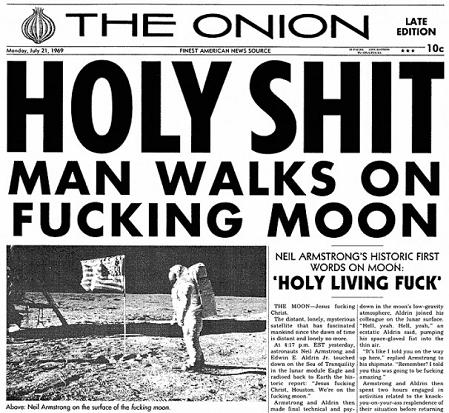Yes, today is the 40th anniversary of Neil Armstrong becoming the first person to step onto another planet, or as The Onion so famously put it:

Sadly, iconic newsanchor Walter Cronkite died just this past Friday before he could celebrate but he had worked round the clock to document that historic weekend:
Commentators often suggest that the Apollo 11 mission was a much-needed triumph for an America reeling from angry anti-war protests and civil rights marches but I’d argue that the Apollo missions were what spurred on these movements — in the sixties, people truly believed that, as a society, we could do anything. As the saying went, if mankind could put a man on the moon, what couldn’t we achieve?
The racially blended cast of ‘Star Trek’ was just one ripple from that splash and, four decades on, it was nice to see that fizzy, optimistic energy back in theatres this summer — even if the politics were lacking. For a vision of the future with a bit more bite, you’ll notice I’ve been relentlessly plugging “Torchwood: Children of Earth,” a five-part miniseries running each night this week on Space and in stores next week on DVD.
The new series steals its tone from “The Bourne Ultimatum” for a crackling thriller (and a controversial one, after the massive shocks in Thursday’s episode — no spoilers!) but most importantly, I love what the show represents — it’s the creator of “Queer as Folk” imagining out gay actor John Barrowman as a bisexual action hero from the future:
There are very few visions of the future that include gay people (not even Barbarella!) so Barrowman’s dashing Captain Jack Harkness is truly a hero for our times — representing a possible world utterly unlike the one this frankly terrifying car salesman lives in:
Watching this guy foam at the mouth over “all the evil in the world,” I wondered what kind of “Mad Max” existence he lives in and then it dawned on me: whenever I hear some latest bit of craziness from the right wing, I’ll wonder if they’re living on the same planet I am, seeing the same things I do, but I had it wrong — they’re living in our world but not in our time!
Conservatives are actually living in the future — a dark, post-apocalyptic nightmare that they, like the people in “Terminator,” have come back in time to save us from. How else to explain them fighting the global warming myth, reporting the white race dying out by 2100, creating new laws to stop human-animal hybrids or documenting the US Anti-Obama rebellion of 2010?
But before we cry out for Captain Jack Harkness to rescue us, there is, of course, one other theory: that the future is not set but built, day by day, with concrete steps taken by people aware of where we’ve been, where we are and where we could go — people like openly gay New York State Senator Tom Duane, who lived through the AIDS crisis in the ’80s and works to keep it from ever happening again.
Very early on Friday morning, as voting dragged on past 3 am, Duane fought to push through a bill to cap rental costs for people living with HIV/AIDS, to offset the staggering costs of medication. Here’s a man tired and angry and fighting for those who need help — a real hero. As Boston blogger David Mailloux explains, it’s what politics can be when people remember the past and push for the future. One small step:

 Why you can trust Xtra
Why you can trust Xtra


